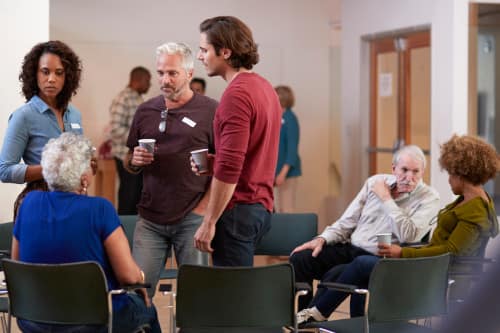Group Therapy

Group therapy helps individuals with similar problems working in groups towards sharing experiences and learning from each other. As a form of psychotherapy, this type of therapy is led by a therapist or other licensed mental health professional. Group therapy is put to use in various settings: hospitals, community centers, private clinics, and mental health facilities. Therapists and mental health professionals may integrate group therapy with other forms of treatment plans to help people handle various challenges in life. There are many types of group therapy, all with set goals and with various benefits to participants.
How is Group Therapy Used?
A therapeutic group puts together a number of people (often strangers) and allows them to grow together in terms of creating connections and interrelationships from shared experiences. Group therapy is crucial in cases where people are grappling with challenges and problems like addiction, personal trauma, or some other mental health issues. It is used where the affected people will gain the most by interacting with others having similar issues. The therapy sessions allow individuals to see that others too have these issues. Participants connect with the shared perspectives, positively encouraging themselves and others into changing or begin to live healthier lives or cope with challenges. Ideally, group therapy works in cases where participants have similar problems or mental health concerns. These include:
- Addiction and dependency
- Depression
- Anger management
- Trauma
- Relationship issues and challenges
- Grief
- Suicide
- Low self-esteem
What Happens in Group Therapy?
Part of what happens in group therapy depends on the type of group and the goal. Usually, a group therapy fosters an atmosphere of trust and participants just talk about their feelings and experiences. None of the members of a group are under pressure to divulge anything they aren’t ready to share. Group therapy might look like the normal support group meeting, with participants encouraged to openly share and learn. However, any progress in a group therapy rests as much on the group members as it does with the trained therapist. Broadly, a group therapist takes the group through several sessions and set goals with the aim of facilitating change and growth. The therapist often models their handling of the group on healthy behaviors that participants need to relate to as they learn, change or begin to cope. In group therapy, the professional adopts a nondirective approach, creating an element of freedom and cultivating trust.

What Types of Group Therapy Are There?
There are several types of group therapy, with the different approaches and goals dictating what type might be the right one for an individual. In recent years, family therapy has taken on some prominence. In most cases, however, group therapy types fall under these categories:
- psychotherapy groups
- cognitive behavioral therapy
- psychoanalytic therapy
- psycho educational group
- process-oriented group
Psychotherapy groups are where therapists employ psychotherapy approaches to help members build interpersonal skills and communicate freely. In Cognitive-behavioral therapy groups, therapists help participants by modeling their behavior patterns. This would be an ideal group if you are struggling with addiction for example. Psychoanalytic group therapy works with repressed memories and how these affect the participant’s thinking and behavior. Psycho-educational groups are led by a therapist who acts as a teacher and helps members get to a specific goal. Process-oriented groups are those that help participants by focusing on the experiences of the group. Outside of treatment therapy groups, people have formed mutual self-help groups like the popular Alcoholics Anonymous. Meetings in such groups are often free for anyone, but the members need to offer mutual support for each other.
How Long Should Group Therapy Last?
According to Ruth Wyatt, a licensed clinical social worker (LCSW), it isn’t possible to exactly pinpoint that therapy will take a “set length of [time].” She notes that “treatment” can take just one session or go on for months and even years. Ideally, however, a session takes between an hour and 90 minutes, with therapy meetings scheduled weekly or biweekly. Psychologists say that the minimum times a group should meet are six sessions. However, due to differences in groups and the goals at hand, some group therapy meetings last months or longer. So, you could have a short-term group therapy lasting somewhere between 6 to 20 weeks. Such groups would likely be for issues around death, divorce or anger management. For a long-term group that holds sessions for close to a year, issues might involve such problems as mental illness.
What Are the Stages of Group Therapy?

In group therapy, participants go through five stages commonly referred to as forming, storming, norming, performing, and adjourning. (Check this PDF) Therapists and other mental health professionals take note of these group therapy stages to better help the members, including applying appropriate interventions.
- In forming (dependency) stage- the initial stage where group members are new to each other. Participants look to the therapist or others within the group for direction.
- Stage two is storming (conflict) where members begin to establish themselves and often tend to look to taking central positions.
- In the norming (cohesion/intimacy) stage, members relax and begin to connect psychologically.
- Stage four is performing (interdependence). This is where the group’s goals begin to take shape. Members share openly and constructively, often at an equal level.
- The final stage is adjourning (termination/separation). Members focus on accomplishments within the group.
How Much Does Group Counseling Cost?
On average, group therapy costs between $60 and $120 per session lasting between 45 and 90 minutes. Group therapy offers a more affordable route to therapy than individual therapy and is possible to find fees that range from as low as $20. Although therapists may set their charges, most health insurance packages offer coverage of between $20 and $50. Nonetheless, it’s not unusual to find costs of over $200 per session. Factors likely to influence the cost of therapy include:
- A therapist’s level of training, specialization, and experience.
- Where the therapy/therapist is located.
- Insurance coverage- less for those covered
- How long the therapy sessions last
One sure step is to always find out the cost of the therapy before you join or whether your insurance provider covers the costs.

What Are the Characteristics of Group Counseling?
Group counseling begins with effective planning and preparation on the part of the counselor. A professional will screen group members, select a manageable group and choose a meeting place for regular sessions. Other than having the materials ready, a group counselor must set and ensure members know of the rules. Some of the characteristics that determine how effective group counseling is are:
- active listening
- shared experiences or similarities
- the flexibility of members to discussing issues
- empathy and encouragement
- ability to confront issues
What are Group Sessions?
Group sessions are meetings involving a set number of participants and for a set period. Usually, there are between six to twelve members in a session, with each group led by qualified professionals. Group sessions can be co-ed or involve one gender. They may also be open or closed – all depending on the issues and group composition. Groups often meet in designated places, with the session providing for a sitting arrangement that makes it possible for everyone to see the other participants. What happens in a session depends on the issue(s) and what goals there are for the group. Some therapists define plans and include certain practice skills to complement the talking.
Why is Group Counseling Important?
An important aspect of group counseling is that participants get to learn social conversation skills. In the process of counseling, a counselor or therapist teaches the group on developing listening and communicating with others. It opens up a patient in an environment that removes the feelings of loneliness. It helps make experiences “normal” as different people share similar experiences and integrates one into the group. The American Psychological Association (APA) advises that diversity in group counseling is important to individuals. People in group therapy come from different backgrounds and have varied personalities. As such, participants get feedback not only from a supportive angle but also as it should be offered.

What are the 3 types of therapy?
There are different types of therapy, but which broadly falls into these three categories: individual (counseling), group therapy, and marriage and family therapy (MFT).
- Counseling or Individual therapy involves a session between a client and a therapist – one-on-one.
- Group therapy has two or more people joining a group to share experiences and learn from each other. The group is led by one or more therapists.
- Marriage and Family Therapy: MFT is a type of therapy offered to families and couples. According to the American Association for Marriage and Family Therapy (AAMFT), there are over 50,000 therapists helping family members to improve communication and relationships. One benefit is to help people live in healthy functional families.
What is a Major Benefit of Group Therapy?
The major benefit of group therapy is that participants get expert guidance from a professional. According to APA, this expert approach offers much more than what an individual would get by participating in general self-help support groups. The therapist’s guidance compliments the fact that patients know other people go through what an individual might be experiencing. The support system, which can go on for a year or so, is very much what makes group therapy an effective approach to psychotherapy. Research has shown that individuals who participate in group therapy benefit a lot from the open and honest sharing that takes place.
What Are the Types of Groups?

Different types of groups are in use when it comes to therapy. In most cases, a group can either be generalized or specialized. A general therapy group is one that focuses on the overall relationships between people. Participants in these groups want to learn and a therapist is there to guide them in setting goals towards these ends. The groups can be co-ed or focus only on one gender. The key factor in these groups is to improve behavior or relationships. Specialized therapy groups are those whose participants are after specific needs. You are likely to come across groups for divorce, grief and loss, sexual assault, anger management and depression among others.
What is the Goal of Group Therapy?
Group therapy benefits mostly those whose issues and problems also affect other people with whom they can share experiences. However, the main goal of group therapy is to encourage behavioral change and healing in people. Here the fundamental goal is to see people develop a sense of sharing, bonding and coping.
Does Insurance Pay for Group Therapy?
Typically, insurance coverage is provided for the individual as well as for group therapy. However, there might be cases where insurances may not cover group therapy. The law provides for insurance companies to cover mental health, behavioral health, and substance use disorders. In this case, it is important to find out from your provider whether they cover group therapy.
What Are Good Rules for a Group?
For groups the fewer the rules the better. Many rules tend to confuse and participants are likely to forget some of, a potential cause of disagreements and conflict. Groups are also likely to benefit the most when applicable rules and guidelines are straightforward and clear. Vague rules only invite mischief from some group members. When setting the rules, the leader or therapist needs to consider a set standard- both ethically and professionally. Good group rules should see members keep group confidentiality, respect others, be active participants and to keep time.
